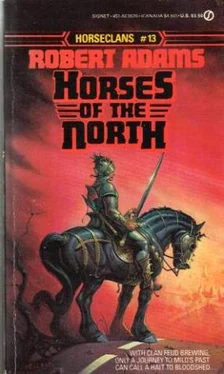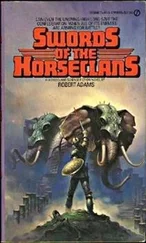Robert Adams
Horses of the North
The prairies and high plains, huge and vast and always awe-inspiring they lie. To the untrained or inexperienced eye, they seem mostly empty, devoid of the life with which they really, truly teem. The grasses—grama grass, blue grama grass, side oats grass, screw grass, tickle grass, buffalo grass and hundreds of other grasses—seem to roll like the waves of some endless sea with the gusts of the untrammeled, ever-blowing winds. These hardy, long-acclimated wild grasses quickly choke out tender grasses loved by man as well as the frail, alien grain crops he was wont to cultivate when still his kind ruled this land.
Moving slowly across these grasslands, following water, graze and the dictates of the changing seasons, as did the bison before them, roam scattered herds of wild cattle. Each succeeding generation of these descendants of feral beef and milch stock is become longer of leg and horns, less bulky and more muscular. In a few areas, they have interbred with surviving bison. Privation has rendered both strains rangy and more hirsute than their domesticated ancestors, while constant predation has favored the survival and breeding of the quicker-tempered, incipiently deadly bovines.
Foremost among the predators preying upon these herds—as well as upon the herds of wild sheep on the high plains—are the packs of wild dogs that are metamorphosing into wolves a little more with each new litter of pups, being shaped by the demands of survival in a savage, merciless environment. Already become big, strong, fleet of foot and as adept at killing as any pureblood lupine, these packs follow the herds of wild cattle and bison hybrids in the long migrations from north to south, just as the long-extinct prairie wolves followed the huge bison herds that once roamed these same lands. The packs do the new herds the same service that the prairie wolves did the bison. They weed the herds of the old, the injured or maimed, the spindly or sickly, taking too the occasional calf.
Of course, the cattle are not the only prey of the packs. The dogs feed on any beast they can individually or collectively run down and dispatch—deer, antelope, wild swine, horses, goats, elk, hares and rabbits or rodents of any size and kind, nonpoisonous reptiles and amphibians, other predators and, in an extreme case of hunger, each other.
For long and long, the packs had been the largest predators upon the plains and prairies, but now their hegemony was ending. Monstrous grizzly bears were descending from the mountains and emerging from the remote areas in which their species had survived the brief reign of firearm-bearing man. There were southerly-straying wolverines, too, and another race of outsize, exceedingly voracious mustelid, big as the very largest bear, though long-drawn-out and lighter in weight. Moreover, moving onto the prairies from the east were small prides of lions, as well as the occasional specimen of other big cats—all or most descendants of zoological garden or theme-park animals, as, too, were the tiny to large ruminants that had been breeding here and there and sometimes moving with the cattle herds in the warmer, more southerly reaches of the range.
In the wake of mankind, the grasslands had expanded apace and were still so doing. The roots of grasses and weeds and brush were helping water, sun, freezes and lack of maintenance to crack and sunder and bury macadam and concrete roads and streets, while rust, corrosion and decay ate away at railroad tracks. Spring floods first weakened, then tore away the bridges not destroyed by man in his terminal madness, and they also scoured the vulnerable floodplains of the deserted, ghost-haunted ruins that once had been thriving cities and towns.
Of the trees loved by man—peach, apple, cherry, walnut, pear, pecan and other crop trees and oaks, elms, maples, poplars, pines, firs and spruces—precious few have survived in the dearth of man’s incessant care. Now, once more, as it was before man strove to bend the land and all upon it to his will, hickories, burr oaks, scrubby hazels, chokecherries, wild plums and dogwoods, cottonwoods, basswoods and red elms are swiftly proliferating to fill their rightful niches.
Only circling hawk and soaring eagle now can see the lines that once delineated the grainfields, gardens, orchards and pastures of the reasoning, but arrogant and unwise, primate who so briefly ruled over this rich land.
Here and there lie tumbled, overgrown ruins-large and small, vast to almost nonexistent—most still showing the blackened traces of ancient fires, others only aggregations of weather-washed stones, broken bricks, rotted wood and pitted, red-rusty iron. In the long absence of those who built them, the ruins now provide home or lair or shelter to the multitudinous rodentia of the land, to the gaunt, rangy, feral cats, to snakes, lizards, toads, bats, nesting birds and hosts of insects and arachnids and worms.
Even in those places that hold no ruins more substantial can be found the windmill towers, all sagging and rust-pitted or gray-weathered and leaning a little farther from off their rotting footings with each season, like the few sorely wounded survivors on some vast battlefield.
But wait!
Speak not too soon of the utter extirpation of man. His kind is not entirely missing from prairie and plains, although nowhere can he be found in his formerly huge numbers.
See, there, as the prairie sky begins to darken toward the encroaching night, one, two, three, many fires are becoming visible along the banks of a small, rushing stream. One could not see them earlier because, fueled by squawwood and sun-dried dung, they are all but smokeless. Bipedal figures move to and fro about these fires. Some are tending a small herd of whickering horses, while others prepare carcasses of deer and hare and other beasts for cooking, pick through baskets of gathered edible roots and plants or bring out saddle querns from the tents and begin to husk and winnow and then grind the painfully garnered wild grains.
Still others are laving their bodies in a sheltered backwater of the stream or washing their clothes on its banks.
Karee Skaht, her bath done, squatted on a flat, sun-warmed rock at the riverside, letting the ever-constant wind dry her bare, sun-browned body. She wrung out her long red-gold hair, then set about laving the sweat and dirt from her shirt and breeches—alternately soaking them with river water, then pounding them against the smooth surface of the rock with the calloused palms of her hard little hands.
In the wide, deep pool that spring floodwaters had excavated, others of the boys, girls and some of the leavening of slightly older warriors who went to make up this autumn hunting party bathed and swam, frolicked and rough-housed, while an equal number worked along the banks and awaited their own turn at the cooling, cleansing, soul-satisfying comfort of the water.
After a few moments, Karee was joined on the rock by Gy Linsee. At fourteen summers, he was only some half-year her elder, but he already overtopped her by nearly two full hands, and a wealth of round muscles rippled beneath his nut-brown skin. It was these round muscles, the big bones beneath, along with his almost black hair and dark-brown eyes that attested to the fact that one or more of his ancestors had not been born of Horseclans stock, but rather had been adopted into Clan Linsee—one of the original clans descended of the Sacred Ancestors.
Noticing the two on the rock, another boy swam to where he had left his clothing, then came over to squat on Karee’s other side … a good bit closer than Gy had presumed to squat. This one was a much more typical Horseclansman—small-boned, flat-muscled, with hair the hue of wheatstraw and pale-blue eyes, his weather-darkened skin stippled with freckles.
Читать дальше












